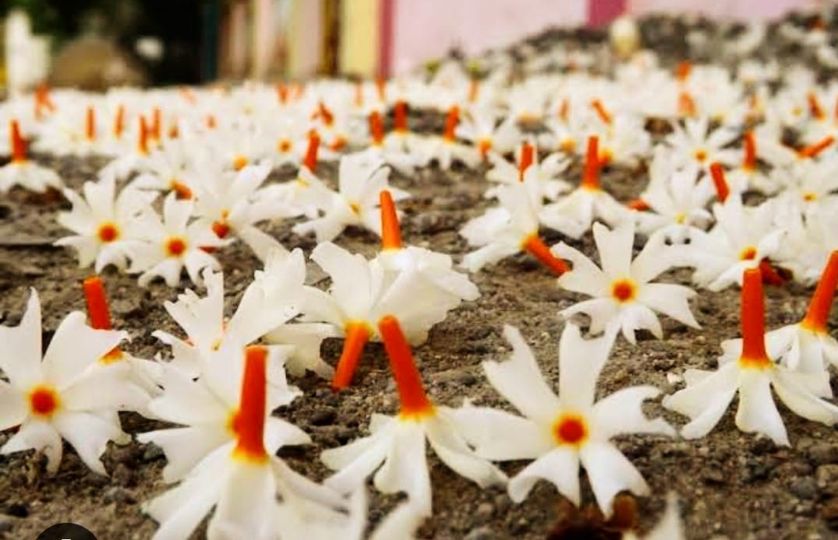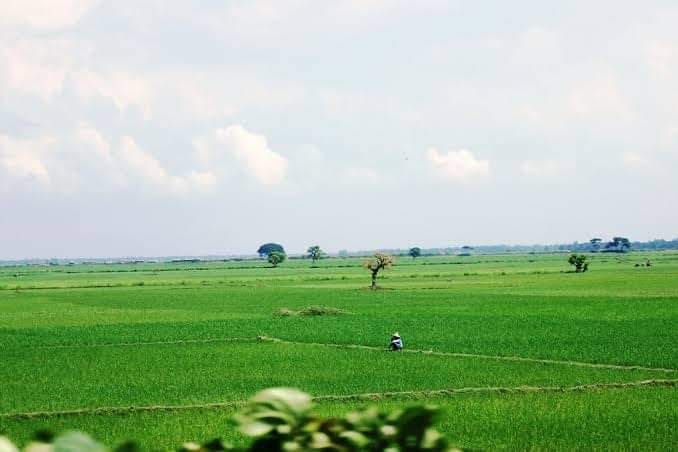Contextualising the ‘social’: Reading Bhimnath Babu and Milton
It is argued that Milton’s Paradise Lost used literature as a medium of expression, Milton intentionally wrote Paradise Lost as a political poem, in which, by re-writing the Biblical story of the Creation, the fall of Satan and the fall of Adam and Eve, he created a strong political subtext which reflected and resonated with the social and political panorama of England of his time. In Maithili literature, village as a lost paradise is a recurring theme. Is it just a loss of a social-cultural or that अनभुआर होइत गाम has a larger political ramification too laddened with literary allegories? Why writings in vernacular should be slotted for a restrictive, compulsive social examination only? Below is the translation of a hugely respected, sahitya akademi awardee’s poem and original in Maithili.
Our lost paradise (my unfamiliar village)
On the village’s Maricha farmlands
Towards Navipokhari pond’s edge
That lay towards the Jhaukathi orchards
Towards Sacred Bankuba baba’s old tree
Be it biting cold or tiring humidity
In pouring rain or in gentle spring breeze
The herdsman grazing his buffalo since before dawn
Sitting on its back or caressing its backbone
Would sing his happy songs in his unique style.
Let the cattle free to graze around
And melodiously sing songs of love
Herding the goats & sheep
He would sing out the poet’s signature
A grown up with the hoe on his shoulder
And/or an elderly with spades tucked away
Would sing of Alha-Udal or Laila-Majnu
Or a gypsy’s lullaby or a poem by Dinabhdra
Or a story from the epic Rai Ranpal.
When I would hear this with my own ears
And I am telling you the truth
Mother nature has picked up the tunes herself and joined in.
From every dalaan (verndah) or khalihan (barn)
Be it the sikki grass mat or the collage rag
the roughest or the torn ones
All the mats would resonate with the
Repeated sounds of the students
Memorizing their lesson through rote verbalisation
Whenever these sounds would reach my ears, morning or evening
I would feel Mother Saraswati (Goddess)
Is blessing the kids foreheads
with her personal caresses.
At every door or any roundabout
At the Goddess’s temple or public platform
Or Khadi Bhandar’s corridoors
Or the youth organisation office
On some mat or at any pleasure place
Grandkids to grandfathers
Somewhere strongly presenting their thoughts
Or somewhere purely gossiping with force
Somewhere in pensive mood
Or somewhere laughter would boom
Somewhere there would be deep discussion
Somewhere poetry and its analysis
The swelling mirth and laughter of
When I would see my community and people
As if life itself gently engulfs the village
Like falling Parijat flowers all across.
My village resonated with
the emerging sounds of infants
merging with the immortal songs of poets Vidyapati-Madhup_Ravindra
Ma Sharda (Goddess) has herself immersed in the tunes.
Be it Gonu baba or Jayanandan baba
A young Kisnu babu or Baldev babu
Bhullu babu or Kullu babu
Everywhere there was loving feel
Everywhere a maternal love
Wherever you went, you got the same
Felt like everyone opened their doors
My village is the same today
My house, household, my place is the same
As is everyone else’s home, aangan (courtyard)
The same doors, same dalaan (verandah)
Even today one can hear the songs in the morning and evening
Coming from the Maricha farmlands,
Even today resonates the students rote learning
Even today they gather grandchildren and grandfathers
(some leaping, some reluctant)
Even today one can hear from many homes
The songs of Vidyapati-Madhup
Even today many people as for my well-being,
I don’t find in those voices
Now any free flowing simplicity
I search deep within the hearts
But the lotus has withered.
Even today, the village booms with the sounds of drums
But now its tone seems faint and weak
Colors are still part of Holi today
But the faces of people seem pale and colorless
Spring visits our village even today
But people keep their faces wrapped up
Courteous folks still ask about your well-being
But their wandering eyes give them away
The faces seem familiar no doubt
But my village seems unfamiliar today.
अपन गामक मरिचा बाध
कि झौआकोठि गाछी दिस
नवीपोखरिक मोहार
कि बनकुबा बबाक थान दिस
जाड़-ठार पड़ौ कि होउ गुमकी-झरकी
उमड़ि अबौ मेघ कि रमकौ वासन्ती सिहकी
अहलभोरेसँ पसर चरबैत
मासिक पीठपर बैसल कि ओकर रीढ़क चमड़ी बकुटने लम्बमान भेल चरबाह
अलबेला स्वरमे संगीत-संधान करै छल ।
कने थमिक’-
मायाजालकें चर’ ले’ अनेरे छोड़ि दैत
आ मचलैत किशोर दल उन्मुक्त तान टेरै छल
फेर कने थमिक-
छागर-पाठी हँकैत टेल्ह सभ
अनायासे कोनो भनिता धs लइ छल ।
फेर कने थमिक-
कोनो प्रौढ़
धयने कान्हपर कोदारि आ कोनो बूढ़
छिट्टा-खुरपीकें माथपर उघने चलैत
आल्हा-ऊदल कि लैला-मजनू
कि लोरिक बनिजारा कि दीनाभद्री
कि राय रनपाल-महागाथाक टुकड़ी अलापै छल ।
अपन कानसँ ई सभ सुनैत रही जहिया
तँ सत्ते कहै छी
बुझि पड़य हमरा
साक्षात् प्रकृति जेना अपनहिसँ भास उठा लेने होथि !
अपन गामक ओहि दलानसँ कि ओहि खरिहानसँ सितलपाटीपर कि खिनहरि-चटगुन्नीपर
खजुरपटियापर कि फटलाहा सपटापर
घोद-मोद बैसल चटिया सभक
खाँत रटैत कि ककहरा घोखैत
उठैत अनघोल
जहिया साँझ-प्रात कानमे पड़ैत रहय
तं सत्ते कहै छी
बुझि पड़य हमरा
ममतामयी सरस्वती नेना सभक चानि
जेना अपनहिसँ सोहरा रहलि छथिन !
अपन गामक
ओहि दरबज्जापर कि ओहि गोलापर
भगवती थानक ओहि चबुतरापर
कि स्कूलक ओहि मैदान मे
खादी भंडारक ओसारपर
कि चौकक दोकानमे
अस्पतालक आगाॅमे
कि युवक संघक अङनैमे
तेसर पहर दिन झुकिते
सतरंजक स’हपर कि कोनो गुलछर्राक तऽहपर
गाम भरिक सभ फरिक
सभ तूरक
लग-दूरक
सभ भाँतिक, सभ कांतिक
नातिसँ लऽकऽ नाना धरि
कतहु क्यों अपनी बात पर जोर दैत
तँ कतहु खाँटी गप्पक बोर दैत
कतहु क्यों एकान्ती करैत
तँ कतहुसँ ठहक्का उठैत
कतहु विचार-चिन्तन चलैत
तँ कतहु काव्यचर्चा होइत
उमडैत हास-उल्लासक मानसरोवरमे
अवगाहन करैत
अपन समाज के देखैत रही जहिया
तँ सत्ते कहै छी
बुझि पड़य हमरा
जेना गाम भरिक आबेशक गाछक सिङरहार
तुबि-तुबिकऽ झहरै छल !
अपन गाममे
ड्योढ़ीटाटक भीतरसँ अबैत
ललना लोकनिक कंठ-मधुमेह घुलल
विद्यापति-मधुप-रवीन्द्रक गीतामृत
पीबैत रही जहिया
तँ सत्ते कहै छी
बुझि पड़य हमरा
सुरमे जेना शारदा अपनहिँ समा गेल होथि !
अपन गाममे
जनिका नजरि पड़य
जनिकेसंगप्प होअय-
रहथु गोनू बाबा कि जयनन्दन बाबा
जवान किसून बाबू कि बलदेव बाबू
भुल्लू बाबू कि कुल्लू बाबू
जिबछा कि किसुनमा…
सभमे आपकता
सभ ठाँ सिनेह-भाव
सर्वत्र ममता…
जेम्हरे जाइ तिम्हरे
जे भेटय सैह
सत्ते कहै छी
ओहि उद्गार-आपकतामे
बुझि पड़य हमरा जेना ओलोकनि सिनेह-पट
हमरा लेल खोलि देथि !
आइयो अपन गाम अछि वैह
अपन डीह-डाबर अपन धाम अछि वैह
ओहिना सभक घर-आङन
ओहिना दरबज्जा, ओहिना दलान
आइयो लगैत अछि मरिचासँ
बनकूबा बबाक थानसँ
ओहनाहे स्वर-संधान भोर-साँझ
आइयो गुंजैत अछि खरिहानपर
चटिया सभक ककहरा-पाठ
आइयो भगवती थानमे
जुटैत अछि नानासँ नाति धरि
(क्यो छरपैत तँ क्यो ठेंगा टेकैत)
आइयो अबैत अछि
कतोक आङनसँ
विद्यापति-मधुपक गुंजन
आइयो कतेको गोटे हमरासँ पुछैत अछि
कुशल-क्षेम
हाल-चाल
मुदा सत्ते कहै छी आइ एहि वाणीमे
भेटैए कत्तौ नहि कनियों मुक्त हास आब
दूर-दूर धरि हृदय-सरितामे तकैत छी
गोट-गोट लोकक
आइयो अपन गाममे
ढोलपर, डम्फापर थाप तँ पड़िते अछि
मुदा आबे ओकर स्वर
जेना बिरस-बिरस बुझाइए !
रंग तँ आइयो खेलायले जाइत अछि
आब मुदा लोकक मुँह
अरे ! बेदरंग भऽ जाइ छैक !
वसन्त अपन गाममे तँ आइयो करैत अछि
मुदा सलगासँ मुँह लोक झपनहिँ रहैत अछि !
कुशल-क्षेम पुछनिहार
आइयो भेटैत अछि
मुद्रा आँख के पुतरी ओकर कोनादन नचैत छैक !
लोकक चेहरा तँ चीन्हल बुझि पड़ैए
आइ अपन गामे मुदा अनभुआर लगैत अछि !
Author: Dr. Savita Jha
Translator: Arvind Jha

 +91-
+91- csts.ind@gmail.com
csts.ind@gmail.com 

